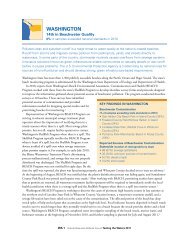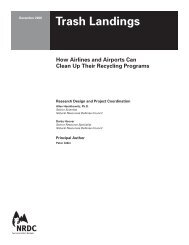US Nuclear Weapons in Europe - Natural Resources Defense Council
US Nuclear Weapons in Europe - Natural Resources Defense Council
US Nuclear Weapons in Europe - Natural Resources Defense Council
You also want an ePaper? Increase the reach of your titles
YUMPU automatically turns print PDFs into web optimized ePapers that Google loves.
U.S. <strong>Nuclear</strong> <strong>Weapons</strong> <strong>in</strong> <strong>Europe</strong> • Hans M. Kristensen/<strong>Natural</strong> <strong>Resources</strong> <strong>Defense</strong> <strong>Council</strong>, 2005<br />
April 6, and the unit stood down on June 20, 2001, 170 end<strong>in</strong>g more than 40 years of U.S.<br />
nuclear weapons deployment to Greece. The Greek media issued contradictory reports<br />
about the Greek government’s response, with some say<strong>in</strong>g a government spokesperson<br />
had confirmed the removal <strong>in</strong> a brief statement, but others say<strong>in</strong>g the government<br />
spokesperson stated that there would be no further comment. 171 In Wash<strong>in</strong>gton, a<br />
Pentagon spokesman decl<strong>in</strong>ed to comment: “We have a long-stand<strong>in</strong>g policy of neither<br />
confirm<strong>in</strong>g nor deny<strong>in</strong>g the presence or absence of nuclear weapons on any <strong>in</strong>stallation,<br />
and that is still our policy. It’s served us well over the years.” 172<br />
Rumors about the removal began several years before the weapons were withdrawn from<br />
Araxos Air Base. In July 1994, the Bullet<strong>in</strong> of the Atomic Scientists reported that the<br />
nuclear bombs “may be gone from Greece altogether.” 173 Several years later, <strong>in</strong> January<br />
2001, media reports <strong>in</strong> Greece reported that special truck convoys had moved the<br />
weapons off the base. The reports were premature, but their removal was imm<strong>in</strong>ent. On<br />
April 6, 2001, U.S. Air Force Headquarters <strong>in</strong> <strong>Europe</strong> issued the Special Order that<br />
directed the deactivation of the 731 st MUNSS at Araxos by June 20, 2001. 174<br />
It is not known if the weapons were moved to Aviano Air Base <strong>in</strong> Italy (the U.S.<br />
custodial unit at Araxos Air Base was subord<strong>in</strong>ate to the 31 st W<strong>in</strong>g at Aviano), another<br />
base <strong>in</strong> <strong>Europe</strong>, or were flown back to the United States. The <strong>in</strong>itial reports <strong>in</strong> Greek<br />
press said that the Italian base was the dest<strong>in</strong>ation, 175 but Aviano Air Base already stored<br />
50 weapons, and with a maximum WSV capacity of 72, add<strong>in</strong>g 20 bombs from Araxos<br />
would fill Aviano almost to capacity. Incirlik Air Base <strong>in</strong> Turkey did not have room for<br />
20 extra weapons, so if the Araxos bombs were kept <strong>in</strong> <strong>Europe</strong> to meet a fixed force level<br />
they might have been transferred to Ramste<strong>in</strong> Air Base. With some redeployment<br />
capacity ma<strong>in</strong>ta<strong>in</strong>ed at Araxos Air Base similar to the Ak<strong>in</strong>ci and Balikesir air bases <strong>in</strong><br />
Turkey, the weapons may still be <strong>in</strong> <strong>Europe</strong>. If Araxos Air Base had been closed, 176 the<br />
bombs would probably have been returned to the United States. The <strong>Nuclear</strong> <strong>Weapons</strong><br />
Deployment Plan (NWDP) that authorizes the number of weapons the U.S. Air Force<br />
must store at each base permits a deviation from the total of up to plus or m<strong>in</strong>us 10<br />
percent. 177<br />
The reason for the Greek withdrawal is not clear, and NATO has not offered an<br />
explanation. NATO statements have cont<strong>in</strong>ued to emphasize the pr<strong>in</strong>ciple of burden<br />
shar<strong>in</strong>g and the widespread deployment of nuclear weapons <strong>in</strong> <strong>Europe</strong>. NATO reportedly<br />
asked Greece <strong>in</strong> 1998 to use new F-16s to take over the nuclear strike role from the<br />
outdated A-7s, but the Greek government decl<strong>in</strong>ed because its scarce resources were<br />
more urgently needed for air defense and conventional missions. 178<br />
The denuclearization of Greece is important also because it is the latest <strong>in</strong> a series of<br />
gradual withdrawals of nuclear weapons from host nation air bases over the past decade.<br />
S<strong>in</strong>ce 1990, the number of host nation air bases that store U.S. nuclear bombs has<br />
decl<strong>in</strong>ed by two-thirds from 12 bases <strong>in</strong> 1990 to only four today (see Table 10). Most<br />
dramatic has been the decl<strong>in</strong>e <strong>in</strong> Turkey, where U.S. nuclear bombs were stored at four<br />
national air bases <strong>in</strong> 1990 compared with none today. 179<br />
56
















